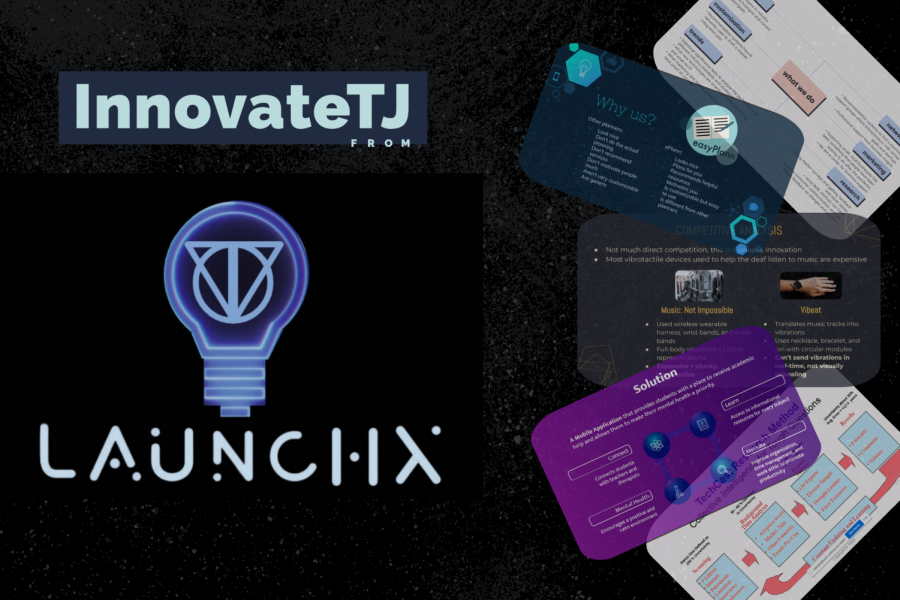Launching into business
LaunchX club hosts InnovateTJ, a business competition where student entrepreneurs pitched original products
Teams pitched original products to judges and listened to guest speaker lectures at LaunchX’s InnovateTJ competition on Saturday, February 20th.
February 26, 2021
Ready. Set. Innovate! After 3 hours brainstorming with team members, InnovateTJ teams place the finishing touches on their speeches to convince judges with real-world business experience that their idea is the next big thing. No pressure.
On Saturday, Feb. 20th from 9 a.m. to 5 p.m., 22 student teams invented original products as part of the LaunchX club’s day-long virtual event, InnovateTJ. High school students from Fairfax, Loudoun, Prince William, and Arlington counties as well as the City of Falls Church had the chance to form teams of 2-4 and deliver a 7-minute pitch on their idea, centered on the theme “Integrating STEM,” to a panel of guest judges. Running parallel to the pitching blocks while other teams presented their products to the judges, students also had the opportunity to network with industry professionals and attend guest lectures, like William Halal’s “Forecasting the Technology Revolution” and Pat Gouhin’s “Demystifying Angel Investors.”
With this clear student interest in business and entrepreneurship, it may come as a surprise that no business-related classes are offered at Jefferson other than economics. This can limit students’ experience to take their novel ideas to the next level.
“Many students at TJ have great ideas and extensive knowledge in various computer science [and] engineering fields which [would allow] them to develop great products to solve many of the problems that we face today… but without a business education, progress can stop at the development phase,” junior Suraj Uppalapati said. “Unlike at a traditional high school, instead of an Intro to Business course, it could be Intro to Innovation. We could use the skills that many TJ students have and teach them how they could apply that from a business perspective.”
Thus, the goal of LaunchX, according to the club president and senior Sophia Suganuma, is to provide students the resources to cultivate their interest in business and create their own start-ups.
LaunchX trains its club members to compete in internationally renowned entrepreneurial challenges, most specifically the Conrad and Diamond challenges. LaunchX club officers, who all have experience and success in such challenges, follow a 3-part approach in pursuit of this goal: lecture meetings, where officers detail the Conrad and Diamond challenges’ rules and guidelines, advisory meetings where officers work with teams to review their draft submissions, and free meetings where officers incorporate fun activities like guest speaker presentations.
However, Conrad and Diamond are long-term investments into business for high school students who are just beginning to explore their interests.
“I’ve known that I’ve been interested in entrepreneurship [and] business, but it was really hard getting people to be on my [Conrad or Diamond] team or sign up for LaunchX [club meetings]… A lot of people, freshmen and sophomores especially, would say things like ‘I’m not 100% sure if I want to be doing business at all, so I don’t want to invest all of my time and money into this year-long competition that requires a couple hours every week,’” Suganuma said.
Therefore, during the 19-20 school year, Suganuma and former LaunchX club president Philip Pan developed InnovateTJ, a day-long entrepreneurship competition designed to serve as a short-term, but still high-quality, experience for high school students interested in business.
“InnovateTJ… is meant to be like Diamond or Conrad, but scaled-down. We also wanted to create more opportunities for high school students to network and meet industry professionals and possibly find sponsorships [since] it’s really hard to get opportunities if you don’t have a parent [in business] or you’re not previously connected in the industry,” Suganuma said.
As Suganuma intended, many student participants appreciated InnovateTJ for the opportunity to dip their toe into entrepreneurship, and as a result, are interested in pursuing more long-term challenges like Conrad in the future. For example, although InnovateTJ was sophomore Nihal Shah’s first business competition, Shah’s team found a way to combine their interests in both computer science and entrepreneurship with their product and InnovateTJ’s 2nd place winner, Autotract, an application that uses machine learning to make lengthy sports contracts more concise and highlight key points. As a result of this short, positive experience, Shah is interested in delving further into business by participating in the Conrad challenge next year.
“I thought of [InnovateTJ] like a hackathon because it’s time-based and you have to work really quickly, and I enjoyed that experience… I’m definitely interested in Conrad, which has an actual application where you can evolve into actually creating the product if need be,” Shah said.
Another benefit to the day-long competition was immediate feedback. Uppalapati, who has competed in business competitions like Conrad previously, appreciated the quick appraisal of his team’s product and InnovateTJ’s 3rd place winner, OpioWatch, a watch which tracks opioid addicts’ vital signs to alert authorities in case of a possible overdose.
“Something I liked more about InnovateTJ was that we got feedback immediately after. It [gave] us a chance to look back on what we could have done better and what we did well rather than having to wait multiple weeks for competitions like Conrad and Diamond to get back to you. Even then, their feedback is sometimes not as transparent,” Uppalapati said.
Designing the competition to take place over a single day is just one example of how the LaunchX officer team regarded accessibility as the key principle of InnovateTJ.
“It’s really hard to find good business [and] entrepreneurship opportunities, especially ones that are free, and especially ones for high school students—when I would research, everything would be like ‘must have undergraduate degree.’ I really wanted [InnovateTJ] to be accessible, especially in this area, so we’ve made it so any [students in] counties within this region can attend and it’s not just TJ exclusively,” Suganuma said.
As a result, 15% of InnovateTJ’s competitors were non-Jefferson students. Without transportation concerns, LaunchX leadership also brought in a more diverse array of guest speakers and judges, from Pallabi Saboo, CEO of Harmonia Holdings and technology advisor to the Secretary of Defense and Secretary of Army, to Miguel Quiñones, Professor of Management at the Robins School of Business and creator of the Corporate Executive Development Program of the Latino Leadership Initiative. Additionally, in order to limit any financial barriers to attendance, officers decided not to charge an entrance fee and instead asked competing teams to submit an optional donation upon registration to make up the prize pool for the event.
However, one of InnovateTJ’s drawbacks was that students didn’t receive as much qualitative feedback. While students’ ideas were judged quantitatively in 8 categories—Innovation, Marketability/Need, Finances, Creativity/Professionalism, the Q&A Session, Speaking Quality, Persuasiveness, and Professionalism—the short time frame left judges little time to detail the reasoning behind their scores.
“There was one judge who, during the Q&A period of [our] presentation, asked nothing but gave the lowest scores for everything. There was a disconnect there because I don’t really understand what he was looking for. From our standpoint, I thought our speech was pretty good; we used up most of the time and we got our genuine points out, so I don’t exactly know what we need to improve on. I think more substantial, qualitative feedback would be helpful in the future,” Shah said.
Uppalapati thinks that it might have been easier to receive qualitative feedback in-person.
“You can’t see [judges’] body language or facial expressions, especially [during the Q&A session] so it’s difficult to understand where they’re coming from. There’s a small disconnect there between competitors and judges, which I feel like could be alleviated in an in-person event because it’s much easier to give feedback on the spot than fill out a points form that would later be sent out to the teams” Uppalapati said.
All in all, both Shah and Uppalapati are interested in further harnessing their skills in business at next year’s competition.
“I think I would participate in InnovateTJ next year. It was definitely an interesting experience, relaxed and fun,” Shah said.


![The TV show “Shark Tank” helped inspire the founders of Commas Club. In fact, they have even incorporated it into one of their big club events. “Obviously, we [the founders] are all big fans of “Shark Tank”, and we realized that's a good way we can help people who've already built out their pitch over the past couple of years, at TJ or before we're even outside of school,” senior Arul Nigam said. “They could bring their pitches and it'll be a fun event for everyone. Not only is it good for practicing your pitches, which are important, but it can also help us discern which ideas the TJ community can get to work on and can best spend their effort.”](https://www.tjtoday.org/wp-content/uploads/2020/12/pasted-image-0-6-300x225.png)
![Smiling, sophomore Emma Ylagan models a new product, cord necklaces, to post on Instagram for J&E Bracelets. “Stepping your foot into the world of [small] business can be a little hard sometimes,” Ylagan said. “[But,] we have the freedom of doing whatever we want, which is really fun.”](https://www.tjtoday.org/wp-content/uploads/2020/10/09A98DCD-06EE-417A-9AA2-D24EFF9662E4-300x188.jpg)





